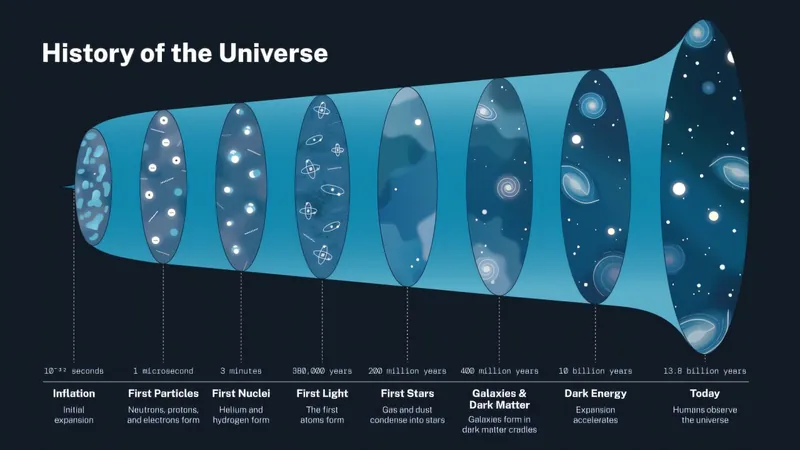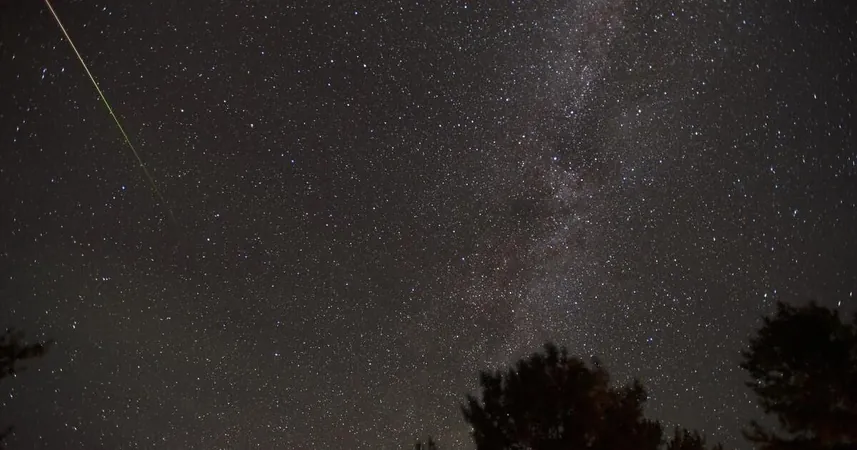
Is Dark Energy a Myth? Groundbreaking Study Suggests a Radical New View of the Expanding Universe!
2024-12-20
Author: Emma
Introduction
In a stunning revelation that could reshape our understanding of the cosmos, researchers from the University of Canterbury in Christchurch, New Zealand, have published a groundbreaking study suggesting that dark energy—long believed to be a critical force behind the universe's accelerating expansion—might not exist at all. This controversial assertion challenges over a century of scientific consensus and invites us to reconsider how we perceive the very fabric of space and time.
The Traditional Understanding of Dark Energy
Traditionally, physicists have relied on dark energy to explain why the universe appears to be expanding at an accelerating rate. It has been viewed as a mysterious force constituting about two-thirds of the universe's mass-energy content. Scientists have used the Lambda Cold Dark Matter (ΛCDM) model, which incorporates dark energy, to make sense of observations of supernova explosions that seem farther away than theoretical models predicted.
The Timescape Model
However, the Christchurch team's innovative research proposes an alternative: the "timescape" model. By analyzing light curves from supernovae, they suggest that the universe's expansion is more complex and uneven than previously thought. According to the research, the differences in observed light are not due to an accelerating universe but rather to variations in the way we measure time and distance in a universe that is indeed "lumpy."
The Implications of Gravity on Time
"Gravity affects the flow of time," explains Professor David Wiltshire, the lead author of the study. "This means that a clock located in the gravitational pull of a galaxy ticks more slowly than one in a vast cosmic void." In practical terms, they found that a clock within the Milky Way might be about 35% slower compared to one in an area devoid of matter, leading to substantial discrepancies in the perceived passage of time and hence the universe's apparent expansion.
Reevaluating Cosmic Dynamics
In essence, the team argues that the illusion of an accelerating universe is a misinterpretation of the complex dynamics involved. They claim their findings could settle some of the most intriguing cosmic puzzles, offering hope that the mystery surrounding dark energy might be unraveled by the end of the decade.
Hubble Tension and Observational Discrepancies
Moreover, the research underscores the growing tension between current observations and the predictions made by dark energy theories. One area of contention is the "Hubble tension," where measurements of the universe's expansion rate taken from the Cosmic Microwave Background (CMB) differ significantly from later measurements made through supernova observations.
Future Directions in Cosmology
The new analysis not only challenges the need for dark energy but also signifies a turning point in cosmology. The European Space Agency's Euclid satellite, launched in July 2023, is equipped to further investigate these claims. It aims to collect over 1,000 high-quality observations of supernovae to differentiate between the conventional ΛCDM model and the emerging timescape theory.
Conclusion
With advancements in observational data and models able to portray the intricacies of the universe more effectively than established frameworks, researchers believe that we are on the verge of a major scientific breakthrough. As the cosmos continues to present its secrets, one thing is clear: the study of dark energy may be more about unraveling the mysteries of time and gravity than we ever imagined.
Stay tuned, as the next chapters in the saga of our universe are written with the potential to redefine how we see the universe and our place within it!









 Brasil (PT)
Brasil (PT)
 Canada (EN)
Canada (EN)
 Chile (ES)
Chile (ES)
 España (ES)
España (ES)
 France (FR)
France (FR)
 Hong Kong (EN)
Hong Kong (EN)
 Italia (IT)
Italia (IT)
 日本 (JA)
日本 (JA)
 Magyarország (HU)
Magyarország (HU)
 Norge (NO)
Norge (NO)
 Polska (PL)
Polska (PL)
 Schweiz (DE)
Schweiz (DE)
 Singapore (EN)
Singapore (EN)
 Sverige (SV)
Sverige (SV)
 Suomi (FI)
Suomi (FI)
 Türkiye (TR)
Türkiye (TR)